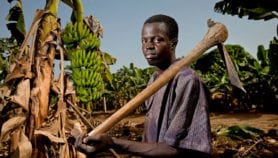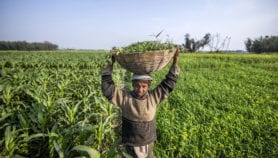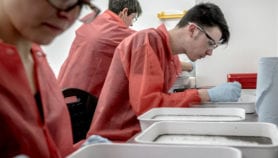By: Kimani Chege
Send to a friend
The details you provide on this page will not be used to send unsolicited email, and will not be sold to a 3rd party. See privacy policy.
[NAIROBI] A panel has been set up to advise the African Union on ways of building capacity to apply and safely handle modern biotechnology.
The African Panel on Biotechnology includes senior scientists and policymakers from across the continent. Its creation was announced on 30 June by the African Union and the New Partnership for Africa’s Development (NEPAD).
The panel will be co-chaired by a former vice-president of the World Bank, Ismail Serageldin of Egypt, and Calestous Juma, the Kenyan former executive secretary of the UN Convention on Biodiversity.
Its creation is "a clear sign the Africa Union is finally pushing Africa towards science-led development" says Norah Olembo, executive director of the African Biotechnology Stakeholders Forum, which promotes public awareness of biotechnology solutions to Africa’s problems.
Juma, also director of the Science, Technology and Globalization Project at Harvard University in the United States, says the panel was created with the view that Africa should stop "playing victim".
"Africa much take charge of its future and assess the usefulness of all existing technological options for meeting its needs," Juma told SciDev.Net.
Launching the panel, Alpha Oumar Konare, chair of the African Union Commission, said it showed "Africa’s determination to take a common informed approach to address issues pertaining to modern biotechnology and its applications for health, agriculture, industry, mining and the environment".
Juma says "important relevant research is being carried out in East Africa on agriculture and in Egypt and South Africa on biomedical research. Nigeria is an important player in a variety of fields".
"The challenge is how to make biotechnology relevant to local needs and how to ensure that existing institutions meet this challenge," he says.
"More specifically, there is an urgent need to look at African universities as vehicles of community development, and one of the key technological opportunities for this is biotechnology."
The panel includes the Ghanaian environmental lawyer George Sarpong, Samuel Nzietchu, director of the Algeria-based African Agency for Biotechnology, and Tewolde Berhan Gebre Egziabhe, Africa’s chief negotiator for the Cartagena Protocol on Biosafety, which governs the international movement of genetically modified (GM) organisms.
Tewolde advocates a ‘precautionary’ approach to GM crops. Despite this, Olembo, whose organisation supports using biotechnology solutions, approves of his appointment.
"The composition of the panel is excellent," she told SciDev.Net.
"The tendency has been to see biotechnology in Africa narrowly in terms of GM crops — this should not be the case," said Olembo, pointing out that biotechnology also has applications in other sectors such as health, industry and the environment.
Olembo said the panel must appreciate Africa’s need to increase capacity to deal with all aspects of biotechnology — from research and innovation, to biosafety and intellectual property. This, said Olembo, would require African countries to increase funding for biotechnology research and development.
The NEPAD Science and Technology Office in Tshwane (formerly Pretoria), South Africa, will coordinate the African Panel on Biotechnology’s activities.













